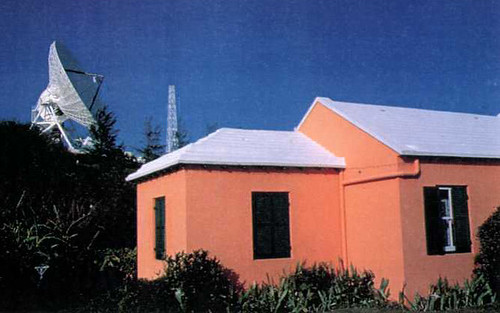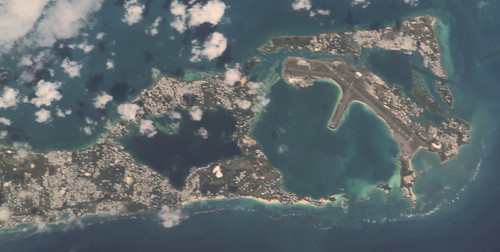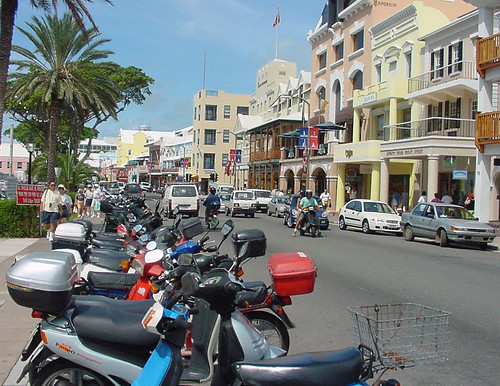Big Broadband in Bermuda

If you’re ever been to Bermuda, you may have noticed a very large satellite antenna in Devonshire Parish while motoring around the island on a rented scooter/moped/motorcycle. We read last month they’ve begun dismantling it since a new submarine cable is being light up for service:
World’s largest commercial satellite dish to be replaced by fibre optic cable
It’s out with the old and in with the new as Cable & Wireless begins tearing down its satellite dish, the Standard A Earth Station antenna.
The dish has been a Devonshire landmark for 24 years and is visible from North Shore and Middle Roads.
A new 800-mile submarine cable that will replace it is due to be operational by the end of October.
It has 700 times more capacity than the old cable it will replace, and will link all of C&W’s customers with access to their global network, the company said.
Like the satellite dish, the telecom firm’s existing undersea cable is obsolete and will be replaced by its new next-generation ‘Gemini Bermuda’ cable.
In its heyday the dish could carry 400 simultaneous circuit feeds to 15 different countries, and could withstand hurricane winds of up to 180mph, the company said.
As telecommunications technology evolves, dismantling outdated equipment like the dish marks the end of an era for Bermuda and indeed the world.
Weighing 400 tonnes and boasting a diameter of 300 meters, the 30-metre-high structure is the largest commercial satellite dish in the world.
"The new undersea cable will satisfy the growing demand for diverse, reliable high-speed data and broadband services which cannot be provided by the restricted capacity of the current cable," said Eddie Saints, C&W’s CEO. "This investment is one in a series of capital investments planned for the Bermuda marketplace in the near future in order to deliver truly world class communications services."
He assured reporters gathered at the facility for a press call yesterday that the transition from ageing cables and satellite transmitters, to state-of-the art fibre optic cables would be seamless.
"It’s extremely reliable and has withstood hurricanes," Mr. Saints said. "If one unit fails, a separate and equal (secondary) satellite takes over."
He said the company will continue to use the 400-tonne base of the station as high-speed data processing centre.
C&W has commissioned M.R. Construction to tear down the dish.
The $750,000 dismantling project, which began three weeks ago, will take another seven weeks to complete. "It cost money to put it up and it costs money to take it down," Mr. Saints said.
Most of the scrap metal will be recycled, some of it here, but most of the materials will go elsewhere.
"Carbon steel remains will be recycled as local mooring weights, [but some material will go to the] landfill," Mr. Saints said. "Other materials such as stainless steel and aluminum will be recycled in the United States."
We rocket scientists always favor recycling materials, so we’re glad to read they’ll be doing that. That’s why Bermuda is cool and at the forefront of technological innovation. Internet access is ample, to be sure.
This new cable, which is owned by Brasil Telecom and runs from Bermuda to New Jersey to Venezuela and Brazil — sort of a modern Bermuda Triangle made of fiber-optic cable — runs along the Continental Shelf, in water ranging from 20 to 600 meters in depth.

Not only are they moderninzing their telecommunications capabilities with other countries, they announced a country-wide RFID system for all their vehicles yesterday. Actually, it’s a first:
Bermuda’s Transport Control Department (TCD), an arm of Bermuda’s Ministry of Tourism and Transport, has launched an island-wide deployment of electronic vehicle registration (EVR) to automate compliance and enforcement using TransCore’s radio frequency identification (RFID) eGo® windshield sticker tags and readers. Initial deployment is underway.
The EVR system will automate enforcement of Bermuda’s vehicle-specific regulations including vehicle inspection, insurance, and registration and ensure the accuracy of vehicle data. Over the next five years, TCD expects to recover approximately $11 million in lost fees from unlicensed vehicles on the island’s roadways and reduce the number of non-compliant vehicles to less than 1 percent.
“Bermuda is a country with 53 square kilometers of land with 65,000 people and 47,000 moving vehicles. We’re the sixth largest population per square mile,” said Randy Rochester, Director of Bermuda’s Transport Control Department. “Bermuda has the world’s highest density per square kilometer of motor traffic on its roads. Consequently, we needed a system to facilitate compliance and lessen the burden on law-abiding citizens and our civil servants. EVR will expedite enforcement and ticketing of those not in compliance and recover lost fees more efficiently than our current manual system.”
TransCore is doing some good work — and they use satellite. We like that.
